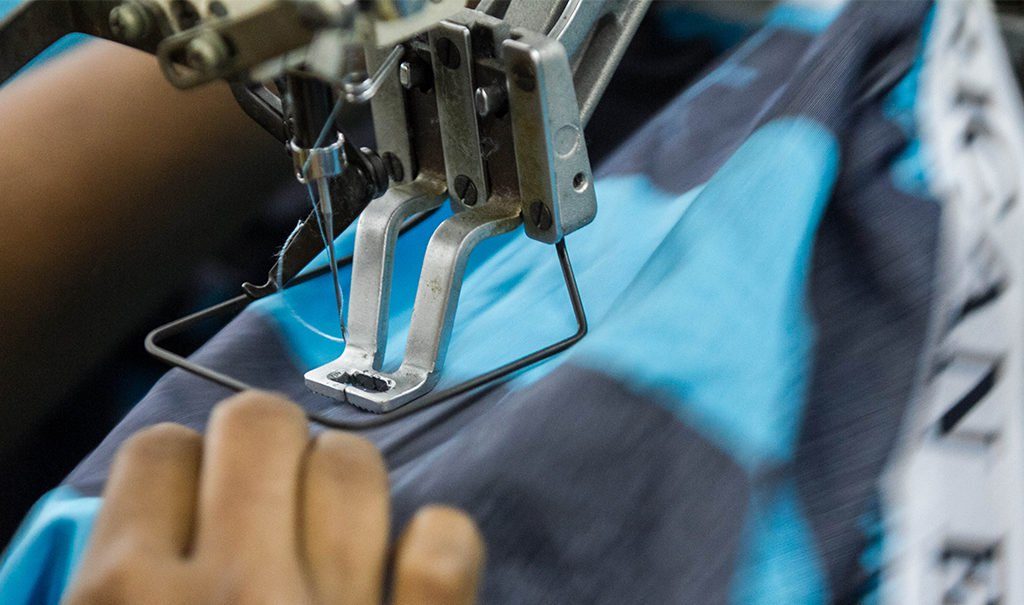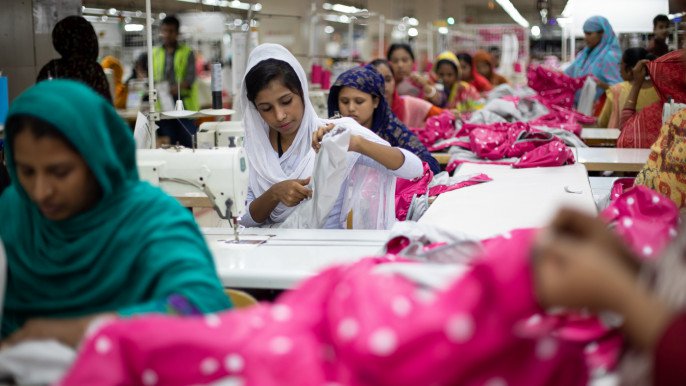Published in Dhaka Tribune on December 26, 2017

Photo: Rajib Dhar/Dhaka Tribune
‘There’s nothing to be complacent about. We need to work harder to further improve safety standards,’ says labour leader Nazma Akter
Bangladesh is moving towards a safer and compliant manufacturing industry, especially in the apparel and leather industries.
Safety inspections were carried out and tanneries were relocated to Savar from Hazaribagh this year to standardise safety requirements.
However, environmental compliance, in terms of pollution of air and water by discharging hazardous chemicals, is yet to be properly addressed.
“After the [Rana Plaza] factory collapse, it was a perilous journey for Bangladesh’s RMG sector to improve safety standards to ensure workplace safety and restore the buyers’ confidence,” BGMEA Senior Vice President Faruque Hassan told the Dhaka Tribune.
“In terms of workplace safety and compliance, Bangladesh’s RMG sector has made significant progress in the outgoing year, which I should call ‘a journey towards [ensuring] safest industry’ in the world,” he added.
Hassan insisted that the recognition came from the buyers and retailers’ platforms, the Accord and the Alliance who are very close to finishing the safety inspection.
According to Alliance’s latest findings, 85% of all required factory repairs have been completed, 80% of high-priority repairs done, while overall remediation has made 80% progress at RMG factories under Accord inspection.
“The biggest area of progress since the Rana Plaza [collapse] has clearly been on workplace safety. If one looks back to before and after April 2013, we can very clearly see that the garment industry has become safer,” Srinivas B Reddy, former ILO Bangladesh country director told the Dhaka Tribune before he left in mid-December.
Bangladesh has seen unprecedented collaboration in fixing workplace safety and over 200 brands and buyers have invested a lot through Accord and Alliance to improve the safety in Bangladesh RMG sector, he added.
The Alliance for Bangladesh Worker Safety (Alliance) is a legally binding, five-year commitment to improve safety in Bangladeshi RMG factories.
On the other hand, Accord is an independent, legally binding agreement between brands and trade unions designed to work towards a safe and healthy Bangladeshi RMG sector.
Nazma Akter, president of Sommilito Garments Sramik Federation, said that significant improvement had been made in safety standards.
“There is nothing to be complacent about,” she told the Dhaka Tribune. “We should continue to work hard for further improvement.”
She said “no compromise to safety” should be the motto of an entrepreneur, adding: “Safety and compliance issues should be taken as a priority, not as a pressure from the buyers or rights groups.
“If the factory is safe, its workers and machines will be safe. And this means, there will be more production.”
Meanwhile, the relocation of tannery units from Dhaka’s Hazaribagh to the newly-built Savar Leather Park started earlier this year thanks to the government’s stern action.
As of December, 102 tanneries have started production in the Leather Park, while others are close to going into production.
“In 2017, the leather industry went through hardship but it is now on the right track to becoming a safe sector,” Md Shakawat Ullah, general secretary of Bangladesh Tanners Association (BTA), told the Dhaka Tribune.
He hoped the sector would be fully compliant in terms of workplace safety after completion of the construction of tannery estate at Savar.
Shakawat noted that lack of necessary infrastructure to ensure smoother communication to the Savar Industrial park was still a challenge that might hamper the sector’s growth.
Environmental compliance yet to be addressed
Despite having made significant progress in terms of workplace safety, the environment is still being polluted by the waste of tanneries at Savar. While the clothing industry is also not fully environment-friendly.
“Compliance in terms of safety and workers’ rights has seen a significant improvement,” Centre for Policy Dialogue (CPD) Research Director Khondaker Golam Moazzem told the Dhaka Tribune.
“But the environmental compliance is yet to get a shape, though there are some green factories in Bangladesh RMG sector it is very negligible compared to the total number,” he noted.
Moazzem pointed out that we cannot term the whole industry environment-friendly because of a few green factories as other factories continue to pollute the environment. “It is too early to comment on the environmental compliance,” he added.
The whole sector should ensure zero discharge of hazardous chemicals, the CPD research director said.
BTA’s Shakawat pointed out: “There are still impediments to ensuring environmental compliance, including the overflow of liquid waste due to the low capacity of Central Effluent Treatment Plant (CETP) and dumping of solid waste in the open.”
He urged the government to fix the situation as soon as possible to make it environment-friendly.
Industries Secretary Md Abdullah said the government had extended the deadline to June 30, 2019, to complete relocation at the leather estate and revising the CETP capacity to contain the overflow.
Several steps have been taken for solid waste management in the estate as well, he added.
‘Dialogue key to resolve crisis’
In last few years, the most discussed issues in Bangladesh manufacturing sector have been safety and compliance. To ensure workers rights and freedom of association and resolving crisis workers leaders suggested social dialogue.
“The good sign is lots of unions have been formed in the apparel sector. But, the question is, are the workers empowered and their rights ensured?” Nazma asked.
“What the sector needs is awareness among the workers and owners. If there is an effective dialogue between workers and owners, I think, there will be no need for a third party to resolve the crisis or [there will be] any untoward incident,” she added.
Focus in 2018
With a lot having been done to ensure workplace safety and workers right, stakeholders say the manufacturing sector will focus on improving workers efficiency and value-added products.
“Since the sector has made significant progress towards becoming a safe industry, in the coming year our focus will be on improving workers efficiency and productivity to remain competitive in the global market,” Exporters Association of Bangladesh President Abdus Salam Murshedy told the Dhaka Tribune.
On the other hand, developing new products and conversion to value added from the basic items will be other focal points, he added.
“The big achievement is our journey to green and sustainable manufacturing,” the former BGMEA president said.
“Bangladeshi manufacturers now are more aware of the environmental impact. They are going to introduce energy efficient and sustainable technology to reduce uses of natural resources,” he added.
 CPD RMG Study Stitching a better future for Bangladesh
CPD RMG Study Stitching a better future for Bangladesh




